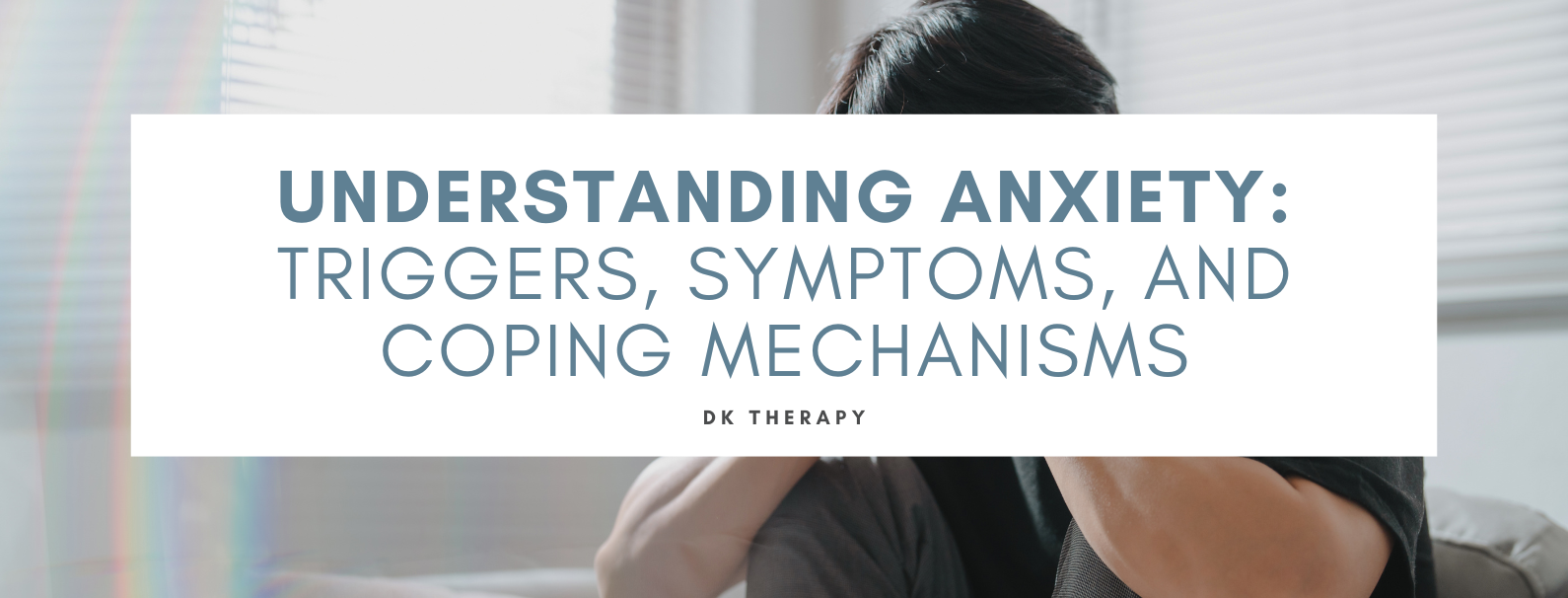
Anxiety is a mental health issue that affects millions of people worldwide. It’s a complex emotional state that can manifest in various ways, and when it does, it can weigh heavily on one’s daily life and well-being. Understanding anxiety involves being aware of its triggers, symptoms, and ways to cope when a bout of anxiety arises.
Triggers of Anxiety
 Anxiety doesn’t usually develop for no reason, but the cause does not have to be limited to a single issue. A traumatic event can induce anxiety, but so too can frequent stressful situations and other challenges. Common triggers include:
Anxiety doesn’t usually develop for no reason, but the cause does not have to be limited to a single issue. A traumatic event can induce anxiety, but so too can frequent stressful situations and other challenges. Common triggers include:
- Stressful Life Events: Major changes like moving to a new city, starting a new job, or experiencing loss can lead to feelings of anxiety. These events disrupt routines and introduce unfamiliar challenges, which can be overwhelming.
- Trauma: Past traumatic experiences can lead to chronic anxiety. The brain and body remember these events, which may cause anxiety to surface even in unrelated situations.
- Genetic Predisposition: A family history of anxiety disorders may increase the likelihood of developing similar issues.
- Health Conditions: Certain physical health problems, such as thyroid disorders or chronic illnesses, can cause or worsen anxiety.
- Substance Use: The use or withdrawal from substances, including alcohol, caffeine, or recreational drugs, can trigger or worsen anxiety.
Symptoms of Anxiety
Anxiety can present in numerous ways, including physical, cognitive, emotional, and behavioral symptoms.
Physical Symptoms
Physical anxiety symptoms include a rapid heartbeat, sweating, trembling, dizziness, and muscle tension. Individuals with anxiety tend to experience these symptoms as a result of the body’s ‘fight or flight’ response.
Cognitive Symptoms
Anxiety can lead to nearly constant worry, racing thoughts, and difficulty concentrating. Individuals might focus on the potential negative outcomes of their choices and struggle at length to manage their thoughts.
Emotional Symptoms
Feelings of fear and dread are quite common among people living with anxiety issues. Individuals might also experience irritability or experience a sense of impending doom for no apparent reason.
Behavioral Symptoms
Anxiety can cause those dealing with it to engage in avoidance behaviors. For instance, someone with social anxiety might avoid social gatherings. Someone with generalized anxiety might procrastinate on important tasks due to their fear of failure.
Coping Mechanisms for Anxiety
While anxiety can be incredibly challenging to manage, there are several strategies you can follow in order to cope.
- Mindfulness and Meditation: Practices like mindfulness and meditation help keep individuals grounded in the moment. Techniques like deep breathing, progressive muscle relaxation, and guided meditation can be helpful for easing the mind.
- Cognitive Behavioral Therapy (CBT): CBT is a therapeutic approach that helps individuals challenge negative thought patterns and behaviors associated with anxiety. It provides strategies for developing healthy thinking patterns.
- Exercise: Regular physical activity is a powerful tool for reducing anxiety. Exercise releases endorphins, which are natural mood boosters that help regulate stress hormones.
- Healthy Lifestyle Choices: Maintaining a healthy diet, getting enough sleep, and limiting caffeine and alcohol can help with managing anxiety.
- Support Systems: Connecting with friends, family, or support groups can provide helpful insights and advice for individuals with anxiety. Sometimes, just talking about what’s going on can offer significant relief.
- Professional Help: Therapists, counselors, or psychiatrists can offer tailored treatments, including therapy and medication if necessary.
Anxiety can feel complicated when you’re living with it, but by identifying triggers, tracking your symptoms, and following the right coping strategies, you stand to manage your anxieties more effectively. Whether through making healthy changes, seeking professional help, surrounding yourself with support, or all of the above, anxiety is manageable.
If you’re struggling with anxiety and you’d like to see how therapy can benefit you, reach out to DK Therapy and schedule an appointment with our office.




